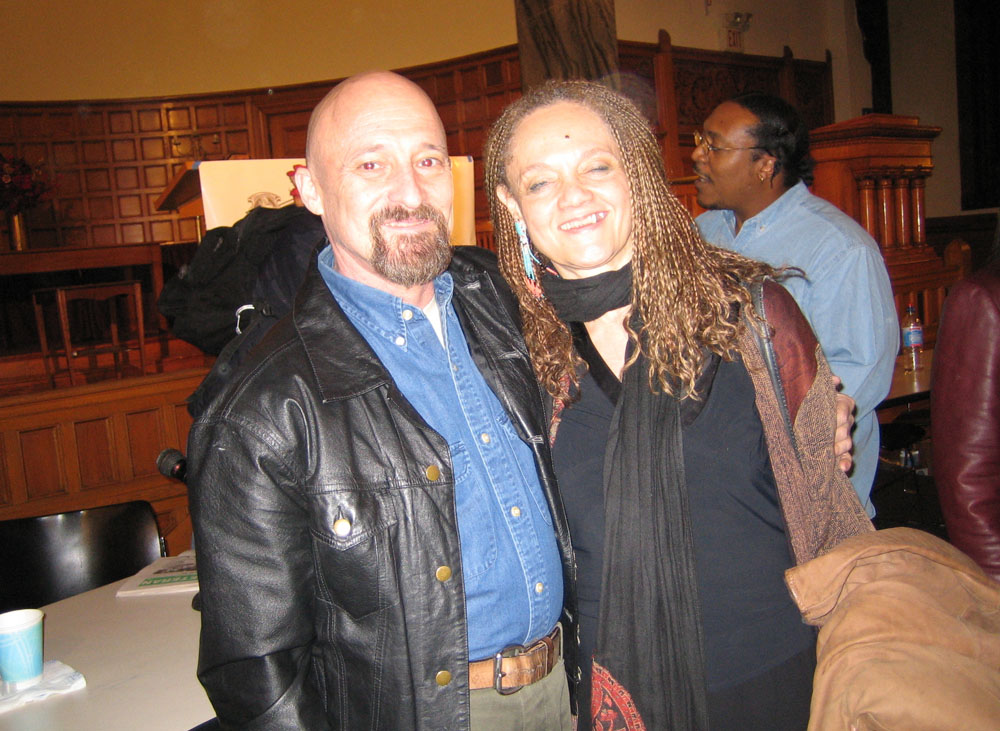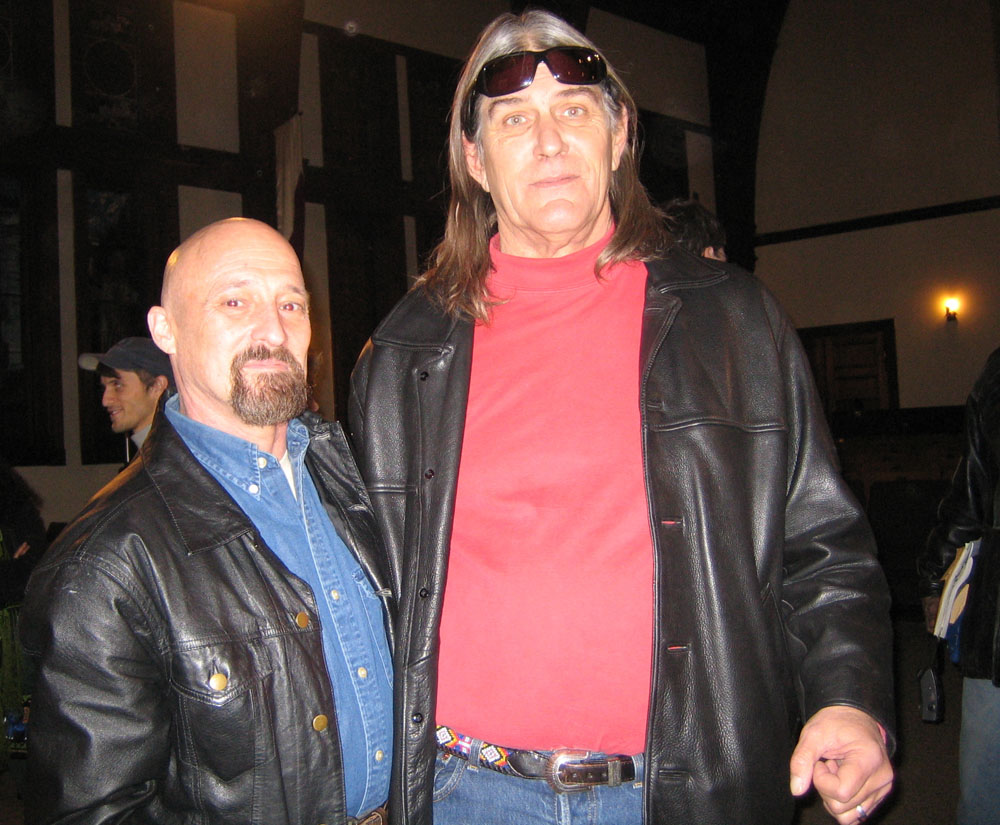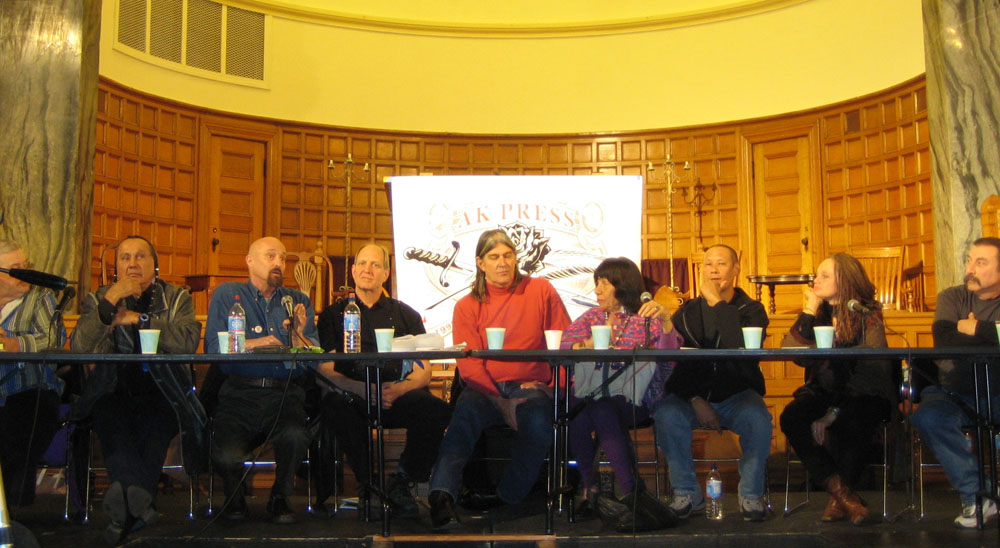 Download PDF of this full issue: v36n1.pdf (6.8 MB)
Download PDF of this full issue: v36n1.pdf (6.8 MB)From Vietnam Veterans Against the War, http://www.vvaw.org/veteran/article/?id=603
 Download PDF of this full issue: v36n1.pdf (6.8 MB) Download PDF of this full issue: v36n1.pdf (6.8 MB) |
On December 4, 2005 I arrived at the First Unitarian Church of Oakland, just a few blocks away from my new home in Oakland, California, to see Barry Romo on a panel convened by AK Press and KPFA. Having recently moved from Champaign, Illinois and missing my friends, I reveled in the idea of Barry and VVAW coming to Oakland, even if only for the evening.
The panel was called "The Future of Struggle: Movement Veterans Discuss Yesterday's Lessons for Today." The idea was to have key figures from various radical movements discuss lessons learned over the last four decades of organizing, how these lessons could be applied to work being done today, and how to move forward.

|
| Barry Romo and Kathleen Cleaver |
In addition to Barry Romo, the panel featured Kathleen Cleaver (Black Panther Party), Russell Means (American Indian Movement), Mike James (SDS and Rising Up Angry), Elizabeth Martinez (Chicana activist and author), Ward Churchill (American Indian Movement), Bo Brown (George Jackson Brigade) and a former member of I Wor Kuen. Since I know him so well, sometimes I forget what a movement celebrity Barry really is, but after seeing him in this impressive crowd, I won't forget again!
The panel opened with a lightning round of obligatory introductions: name, organization, and lessons learned. Barry opened by saying, "I never thought that there would be a war worse than Vietnam, but this [the war in Iraq] is worse. These vets have to worry about going back. Today, we are working with these younger vets. We didn't think that we would make it to thirty years old, let alone form an organization that is now almost forty years old."
During the introductions, Ward Churchill also mentioned VVAW in his remarks, saluting the organization for standing in solidarity with AIM. "VVAW was at Wounded Knee with us, and it is in large part because of VVAW that our lives were saved."
After introductions, the first four questions from the panel and audience were directed at Barry. Kathleen Cleaver opened the questions by asking Barry to talk more about VVAW, saying, "I want more people to know about VVAW. I've always been very impressed with their clarity of views. VVAW's statement on Iraq was literally the only coherent statement I saw."
Then Elizabeth Martinez asked Barry to speak about counter-recruitment. Barry responded, "We get into high schools, even with a name like Vietnam Veterans Against the War. And we were recently on the NewsHour with Jim Lehrer talking about the education we do in high schools."
When an audience member asked if they should feel ill will toward the soldiers currently in Iraq, Barry responded, "The people in the military are not your enemies. Some of them are. They tend to wear four stars. They tend to work in the Pentagon and send poor kids to war who only dreamed of buying a home for their parents."

|
| Barry Romo and Ward Churchill |
Ward Churchill added, "VVAW did these silent marches. All you could hear were boots hitting the street. Once a Republican woman came up to us and said, 'What are you doing to the morale of the troops?' And VVAW would say, 'Lady, we are the troops."
Mike James asked Barry to speak about what work is happening today with soldiers still in Iraq and recently returned veterans of the Iraq War. Barry talked about the formation of Iraq Veterans Against the War and the support that VVAW is giving to them. He encouraged people to connect with Iraq veterans and welcome them into the antiwar movement. "People didn't spit on me when I came back and was doing my drugs and alcohol. They told me that the war was wrong, which I knew in my heart, but I couldn't say it yet. But you gotta stay connected to who you once were, and to where other people are at right now. People shouldn't have to learn your language to talk to you. As Dave Dellinger used to say, as a movement, we have to be like an escalator that brings people along with us, not an elevator of activists that leaves the people behind."
When asked his advice for the younger generation thinking about organizing, Barry responded, "Organizing doesn't mean that you have to give up your life, a family, or friends. Because we live here, and not other places where there is more repression if you speak out, we have a responsibility to act. But I also know that you have to have a good time doing it. If some really boring person comes up to you and doesn't know how to party, I want you to walk away really fast. In Vietnam, I thought that I would never have friends like my platoon mates. But now I do. The movement will give you friends for life." I was reminded how right he was; I consider my VVAW friends and other movement friends to be my friends for life.
Over the years, I've been to a lot of events in the activist community that featured movement veterans reflecting on their experiences. And I've sat bristling at too many of them, who lament the supposed apathy on the part of my generation and generations coming up after us. That's not true—there's a vibrant movement among today's young folks. And if it were true, what would that say about the movement they helped build, one that didn't move young folks up through its ranks?
As I listened to Barry speak that night, I thought about the title of the panel, "The Future of Struggle." VVAW is the future of the struggle, because of the next generation of organizers it has trained, recruited, and found places for in the movement; but also because VVAW continues to do work that is on the very cutting edge of building an antiwar America.
Brooke Anderson is a VVAW member and lead organizer for the East Bay Alliance for a Sustainable Economy in Oakland, California.

|